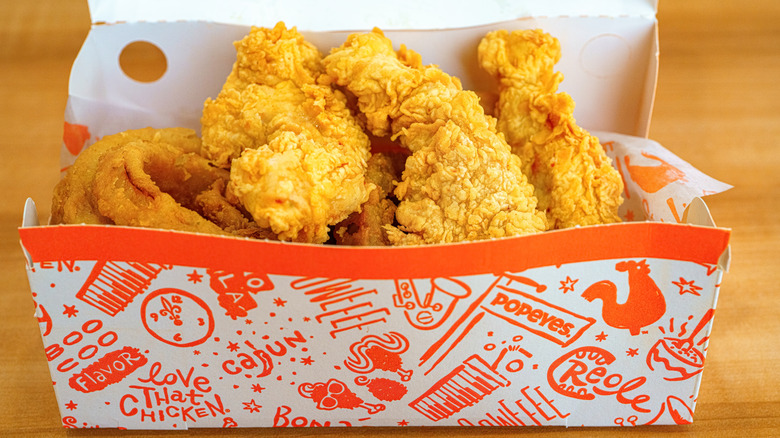This Popular Fried Chicken Chain's Old-School Flavor Secret? Beef Tallow
Along with peanut oil and pickle brine, beef tallow is one of the many ingredients fast food joints use to make food taste better. For instance, Popeyes uses tallow to create its famous fried chicken. The ingredient also makes an appearance in other foods available at the chain, including fries, seafood dishes, and even desserts. For those unfamiliar, beef tallow is derived from fat that's attached to bovine organ meat such as the kidneys. These components are subjected to a low and slow cooking process to help separate the fat, resulting in an ingredient that's solid at room temperature but breaks down when heat is applied.
The chain's use of beef tallow appears to have paid off, as illustrated by QSR's 2024 ranking of the top-selling chicken restaurants. Popeyes placed second after Chick-fil-A. This type of fat's biggest attraction is arguably the multi-faceted, savory flavor profile it creates in fried foods. It also boasts a smoke point of 400 degrees Fahrenheit, making it great for achieving a nice crunch. However, people have also made claims about the nutritional benefits of beef tallow that may be overstated. It's true that this ultra-concentrated animal fat does include a small portion of vitamin D and other nutrients, but the high concentration of saturated fat negates any health benefits one might derive.
Why don't more restaurants use beef tallow in their food?
Given how much customers love the beef tallow-fried chicken from Popeyes, you may be wondering why more restaurants don't include it in their menus. This flavorful fat was once a cooking staple. However, both consumers and restaurants began making the move away from the ingredient in the 1960s as the risks of saturated fats became more evident. Seed oils such as canola, peanut, and soybean took the place of beef tallow in many instances, but these cooking alternatives have also been subject to health controversies. Seed oil detractors claim they can increase heart disease risk and lower immune function and may even be toxic.
Research suggests that when consumed in moderation, seed oils aren't likely to affect healthy people adversely and don't contain toxic elements. They aren't associated with the same risks as animal fats like beef tallow. In fact, certain seed oils, including canola, offer positive health effects like fighting inflammation and increasing levels of good cholesterol. Despite the many cooking oil options and their possible benefits, Popeyes likely won't be switching to a healthier menu any time soon. The chain believes in giving customers what they want when it comes to tasty fried foods, and most people visiting the fried chicken restaurant may not be searching for more nutritious options.

